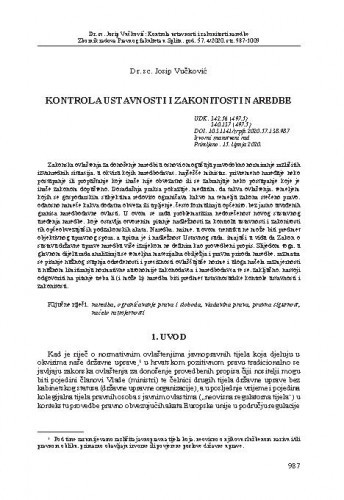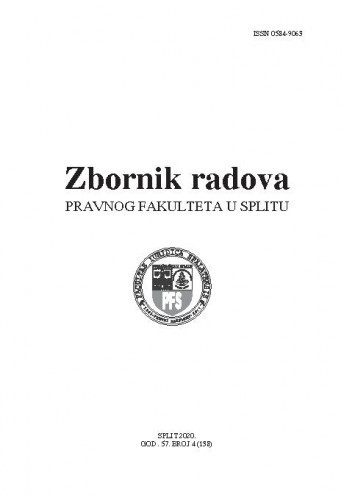Zakonska ovlaštenja za donošenje naredbi u osnovi omogućuju pravodobno normiranje različitih izvanrednih situacija, u okviru kojih naredbodavac, najčešće ministar, privremeno naređuje neko postupanje ili propuštanje koje inače nije obvezatno ili se zabranjuje neko postupanje koje je inače zakonom dopušteno. Dosadašnja praksa pokazuje, međutim, da takva ovlaštenja, temeljem kojih se gospodarskim subjektima redovito ograničava kakvo na temelju zakona stečeno pravo, odnosno nameće kakva dodatna obveza ili trpljenje, često formuliraju općenito, bez jasno utvrđenih granica naredbodavne ovlasti. U ovom se radu problematizira nedorečenost novog sustavnog uređenja naredbe, koje ostavlja otvorenim pitanje nadležnosti za kontrolu ustavnosti i zakonitosti tih općeobvezujućih podzakonskih akata. Naredba, naime, u ovom trenutku ne može biti predmet objektivnog upravnog spora, a upitna je i nadležnost Ustavnog suda, imajući u vidu da Zakon o sustavu državne uprave naredbu više izrijekom ne definira kao provedbeni propis. Slijedom toga, u glavnom dijelu rada analiziraju se temeljna materijalna obilježja i pravna priroda naredbe, razmatra se pitanje nužnog stupnja određenosti i preciznosti ovlašćujuće norme i uloga načela razmjernosti u nužnom limitiranju normativne autonomije zakonodavca i naredbodavca te se, zaključno, nastoji odgovoriti na pitanje treba li (i može li) naredba biti predmet ustavnosudske kontrole ustavnosti i zakonitosti.; Legislative authorisation to issue orders essentially enables timely regulation of various emergency situations, in which such an order is usually demanding an action or omission that is otherwise not mandatory, or prohibiting an action that is otherwise legally permitted. However, our legislative practice thus far has shown that such legislative authorisation often contain vague or general formulations, without clearly defined boundaries of the authority on the basis of which some additional restrictions or obligations are regularly imposed on business entities for the duration of an intervention measures. This paper primarily examines the vagueness of the new systematic regulation of orders, which leaves open the question of the competence for the review of the constitutionality and legality of this generally binding subordinate legislation. Specifically, an order cannot be the subject of an objective administrative dispute at the moment, and the jurisdiction of the Constitutional Court is also questionable, since the State Administration System Act no longer explicitly defines an order as an implementing regulation. Consequently, the main part of the paper analyses the basic substantive features and legal nature of the order, examines the issue of the necessary degree of specificity and precision of the authorising norm as well as the role of the proportionality principle in the necessary limitation of the regulatory autonomy of the legislator and the issuers of orders, and, in conclusion, seeks to answer the question of whether the order should (and can) be subject to constitutionality and legality review by the Constitutional Court.
Sažetak

 Zbornik radova Pravnog fakulteta u Splitu : 57, 4(2020) / glavni i odgovorni urednik Arsen Bačić.
Zbornik radova Pravnog fakulteta u Splitu : 57, 4(2020) / glavni i odgovorni urednik Arsen Bačić.